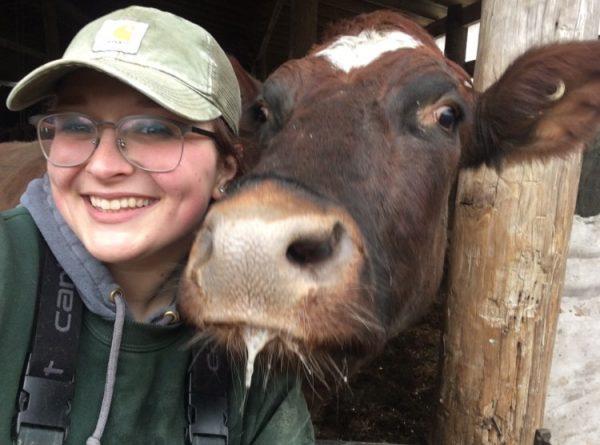Current Position:
Consumer Safety Inspector, USDA
What were you doing before entering the Masters in Animals and Public Policy (MAPP) program?
Before entering the MAPP program at Tufts I was completing my degree in Animal Science at URI.
What aspects of MAPP led to your decision to join the program?
My passion for animal welfare, specifically in agriculture, led me to pursue joining this program!
Interests in and experience with animals
My involvement in a livestock 4-H club when I was younger got me interested in pursuing an education involving animal science. I went to an agricultural high school where I majored in Large Animal Science, and then attended URI and got my degree in Animal Science. I have worked on a dairy farm, livestock farm, and as an animal care technician in a medical research lab.
What are your outside interests?
Outside of working with animals I enjoy hiking, gardening, and reading!
Number of pets? What?
I have 2 cats, one dog, and a few laying hens.
MAPP Externship
This summer, I worked as an Agricultural Programs Technician for the United States Department of Agriculture’s Farm Service Agency. I worked in the county level offices administering government financial assistance programs to livestock producers. The newest program administered through the Farm Service Agency was the Coronavirus Food Assistance Program. This financial aid program was developed in order to help agricultural producers that suffered direct losses as a result of the COVID-19 pandemic, such as losses in sales and increased marketing costs. For this program, I researched potential eligible livestock farmers and administered outreach materials. Most of my work this summer was to support and implement this program, in addition to various daily administrative tasks.
Throughout my internship with the USDA I was able to gain insight on how government programs are developed and implemented for livestock producers. I also was able to gain a deeper understanding of the culture of New England Agriculture. Furthermore, from “USDA Leadership Briefings” web presentations hosted by the Department throughout the summer, I was able to learn a lot about the structure of the Department of Agriculture and the 29 different agencies it consists of.
The things I learned about government processes throughout my time in the MAPP program was tremendously helpful throughout my internship. Learning about bureaucracies within the government as a MAPP student prior to becoming a government employee allowed me to better understand government processes once I was in my official role. The tools I developed in the MAPP program to analyze stakeholders was beneficial while I was interpreting federal programs in my position as an agricultural program technician at the USDA.
